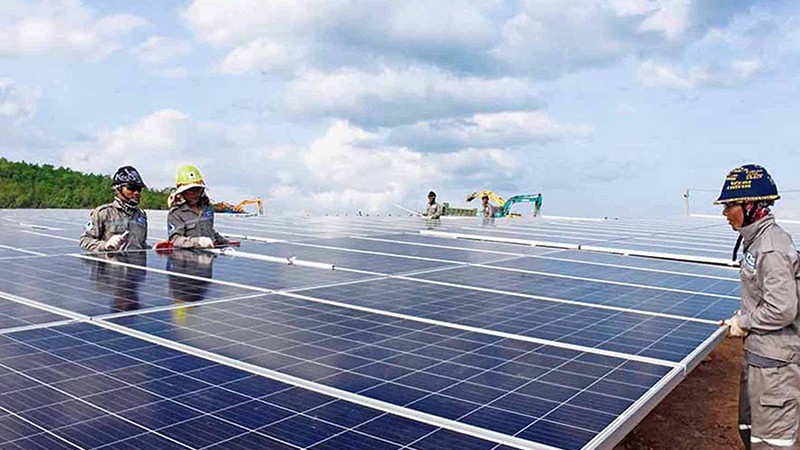At the Climate Summit, held within the framework of the 26th United Nations Climate Change Conference of the Parties (COP26) in Glasgow, Scotland (the UK), Prime Minister Pham Minh Chinh reaffirmed Vietnam's strong commitment in responding to climate change in order to achieve zero emissions by 2050.
Focusing on the private sector
According to economic experts, raising the commitment to reduce greenhouse gas emissions will benefit Vietnam in many ways, helping it be able to attract green resources from the financial package committed by countries for developing green economy, circular economy and renewable energy. And in fact, within the framework of the COP26 activities, financial institutions have signed commitments to pour billions of US dollars into green growth programmes and projects in Vietnam through domestic private economic groups.
In order to fulfill this commitment, the energy sector and investment resources from the private sector will play a very important role. A report released by the Central Institute for Economic Management (CIEM) has shown that, in recent years, private sector investment in green growth has increased significantly. Dr. Ho Cong Hoa, Team Leader of the project "Improving the role of private investment in green growth in the period of 2021 - 2030" said: In the period 2010 - 2019, the number of private enterprises investing in the energy and environment sectors has increased sharply. Specifically, in the field of energy (producing wind power, solar power), there were 69 enterprises investing in 2010, accounting for 59%; this increased to 777 enterprises in 2019, accounting for 94.8%.
In the field of the environment (water supply and drainage and wastewater treatment, solid waste and environmental treatment), there were 693 enterprises participating in investment in 2010, accounting for 81.5%; this increased to 2,713 enterprises in 2019, accounting for 95.8%. Notably, in 2010 and 2015, private enterprises completely owned the "playground" of solar power investment, without the participation of state enterprises. This positive growth is due to the promotion of policies to mobilise private investment for green growth towards sustainable development.
However, Dr. Ho Cong Hoa also pointed out that there are still many barriers to attracting private investment resources into green growth projects, making the development scale of the green economy quite small. It is asynchronous and unstable in its mechanisms and policies, the most noticeable being the price of solar power changing continuously in a short time; lack of reciprocal capital and capital for public investment in infrastructure projects. Many ministries, branches and localities still have the mentality of relying on budget capital instead of mobilising private capital. In many fields, the process of licensing investment, development, construction, and operation of projects takes time and is complicated.
Sharing risks and creating an equal environment
From the actual development and implementation of the green growth action plan of Hanoi city, Dr. Nguyen Diem Hang, Head of Urban Research Department under the Hanoi Institute for Socio-Economic Development Studies, said that although Hanoi issued the plan two years ago, its implementation is still very confusing. As the policies promulgated by the State but implemented by private enterprises and the community, there are no annual statistics on the results of green growth implementation of localities to serve as a basis for assessment and to draw from the experience in its implementation. In order to develop a green growth strategy, the role of the each locality must be clearly defined.
Risk sharing between the State and enterprises is considered an important issue in attracting private capital for green growth. According to Dr. Nguyen Anh Tuan, Director of Renewable Energy and Clean Development Mechanism Centre under the Ministry of Industry and Trade, there will be a sudden growth in renewable energy from private capital, especially wind power, in 2020. In just ten days, power capacity has spiked from 300 to 600 MW to nearly 1,000 MW due to investors promoting the project to take advantage of incentives from the change in electricity price policy.
Investors have poured money into increasing the source capacity, but then, the consumption of renewable energy in general and wind power in particular was cut suddenly as the demand for electricity dropped sharply due to the Covid-19 pandemic, stalling production. This greatly affects the economic efficiency of clean energy projects. “The risk-sharing mechanism between the State and private investors is very important. The private sector participates in clean energy investment but does not have a risk-sharing mechanism, so when the demand for electricity dropped sharply, investors have to bear all the risks, making them cautiously consider investing in the future", said Dr. Nguyen Anh Tuan.
On October 1, the Prime Minister approved the National strategy on green growth for 2021-2030, with a vision to 2050, to promote economic restructuring associated with growth model innovation, contributing to the post-COVID-19 economic recovery. In order to attract private investment resources for green growth, the CIEM research team believes it is necessary to issue a preferential mechanism by the State. But most importantly, it is necessary to improve the investment and business environment in the field of environment and energy, gradually creating a transparent, equal and fair environment among the economic sectors.
Besides this, it is necessary to apply economic tools such as green banking development and green credit to help businesses access green financial resources; promote the implementation of green public procurement policy; study the possibility of applying a carbon tax according to an appropriate roadmap to orient the production, business and consumption of society in the future. Legal corridors, mechanisms and policies must be both mandatory and encourage businesses to invest in green growth, enforce social responsibility for the environment, and develop sustainably.
















